- Home
- Jasper Fforde
Early Riser
Early Riser Read online
Also by Jasper Fforde
The Thursday Next Series
The Eyre Affair
Lost in a Good Book
The Well of Lost Plots
Something Rotten
First Among Sequels
One of Our Thursdays is Missing
The Woman Who Died a Lot
The Nursery Crime Series
The Big Over Easy
The Fourth Bear
Shades of Grey
The Dragonslayer Series
(for young adult readers)
The Last Dragonslayer
The Song of the Quarkbeast
The Eye of Zoltar
VIKING
An imprint of Penguin Random House LLC
penguinrandomhouse.com
Copyright © 2018 by Jasper Fforde
Penguin supports copyright. Copyright fuels creativity, encourages diverse voices, promotes free speech, and creates a vibrant culture. Thank you for buying an authorized edition of this book and for complying with copyright laws by not reproducing, scanning, or distributing any part of it in any form without permission. You are supporting writers and allowing Penguin to continue to publish books for every reader.
First published in Great Britain by Hodder & Stoughton, a division of Hachette UK
ISBN 9780670025039 (hardcover)
ISBN 9780698170346 (ebook)
This is a work of fiction. Names, characters, places, and incidents either are the product of the author’s imagination or are used fictitiously, and any resemblance to actual persons, living or dead, businesses, companies, events, or locales is entirely coincidental.
Version_1
For
Rhulen Marya Ivy Anna Fforde-Gorringe
Made in Australia but inspired by Wales
. . . and who knows a thing or two about hibernation
Contents
Also by Jasper Fforde
Title Page
Copyright
Dedication
Mrs Tiffen could play the bouzouki
Fat Thursday
Jack Logan
Testing time
Cardiff nights
Oliver Tiffen goes hot
Merthyr
Meet Aurora
The John Edward Jones
Over the hump
Talgarth and HiberTech
The Wincarnis
Consulate and Fodder
Marooned
The Sarah Siddons
Room 901
Trip to the Gower
Dream, wake, repeat
Jonesy
Starving in the basement
The Wincarnis
The Consulate
Toccata
HiberTech
Fodder
The Museum
Villains
Truce busted
Something rotten in the winter
Dream again
Dawn and the dead
A remote farm in Lincolnshire
Jonesy
The Farnesworths
Dreamspace
Fired & filing
Charlie Webster
Thumped
H4S radar
The Geraldus Cambrensis
The cylinder
Night in the museum
Night in the museum 2
White-out
Orientation
Dreamspace
The Awakening
Acknowledgements
About the Author
Mrs Tiffen could play the bouzouki
‘ . . . Survivability has increased during hibernation since the introduction of Dormitoria, efficient weight-gain regimes and Morphenox, but superstition and fear remain. The Hib is about rest and renewal as much as about dodging the Winter’s worst, and we did our bit to make the oily tar of longsleep seem warm and friendly . . . ’
– from Seventeen Winters, by Winter Consul Lance Jones
Mrs Tiffen could play the bouzouki. Not well, and only one tune: ‘Help Yourself’ by Tom Jones. She plucked the strings expertly but without emotion while staring blankly out of the train window at the ice and snow. She and I had not exchanged an intelligent word since we first met five hours before, and the reason was readily explained: Mrs Tiffen was dead, and had been for several years.
‘It’s going to be a mild winter,’ said the grey-haired woman sitting opposite Mrs Tiffen and me as the train pulled out of Cardiff Central. ‘Average low of only minus forty is my guess.’
‘Almost balmy,’ I replied, and we both laughed, even though it wasn’t funny, not really, not at all.
After some thought, I had concluded that the woman was most likely an actor, part of the extensive Winter Thespian Tradition. Audiences were small, but highly appreciative. Summer players had to make do with the diluted respect of the many whilst Winter Players commanded the adoration of the few.
The train stopped briefly at Queen Street, then rumbled slowly north. It could have gone faster, but Wales has a 75 dB sound limit in operation eight days either side of the Winter.*
‘Have you been overwintering long?’ I asked, by way of conversation.
‘I’ve not seen a Summer for almost three decades,’ she said with a smile. ‘I remember my first venue: Hartlepool, Winter of ’76, the Don Hector Playhouse. We were performing King Lear as the support act to the Chuckle Brothers during their one and only Winter tour. Their gig was packed – almost three hundred people. Never seen that happen before except with the Bonzo Dog Band or Val Doonican, but then they made the Winter season a kind of trademark, like Mott the Hoople and Richard Stilgoe in the old days and Paul Daniels and Take That today.’
Few Summer acts chose to brave the cold – the Winter could be a hard taskmaster. The 1974 Showaddywaddy Welsh tour was a good case in point: the band were first trapped by Hunger-crazed nightwalkers in their Aberystwyth hotel, then lost half their number to an ice storm. Over the next two months their manager was kidnapped and ransomed by ‘Lucky’ Ned Farnesworth, three roadies lost their feet to frostbite, and their bassist was allegedly taken by Wintervolk. Aside from that, the surviving members thought it was one of their most successful tours ever.
‘Never realised how strongly the silence could drag upon one’s psyche,’ said my companion, breaking into my thoughts, ‘and how the solitude can become physically painful. I once went seven weeks without seeing a single soul, stranded in the Ledbury Playhouse during a protracted coldsnap in ’78. Colder than the Gronk’s tit and for four weeks a blizzard. Even the Villains hunkered down, and nightwalkers froze on their feet. Come the melt the rigor kept them upright – they didn’t start falling until they’d thawed down to their shins. For those not with the calling, the absence of humanity can be debilitating.’ She paused for a moment before continuing. ‘But y’know, in some strange way, I love it. Good for achieving a sense of . . . clarity.’
Long-time Winterers were well known for expressing their views in this manner – a dark love of the bleakness, and how conducive the solitude was to deep philosophical thought. More often th
an not, those that extolled the Winter virtues so fulsomely did so right up until the moment they left an overly apologetic note, stripped themselves naked and walked outside into the sub-zero. It was called ‘The Cold Way Out’.
‘Lobster,’ said Mrs Tiffen without relevance to anything, still playing the bouzouki. ‘Help Yourself’, again, for perhaps the two hundredth time.
Returning from the depths of hibernation was never without risk. If the minimal synaptic tick-over that took care of nominal life functions was halted, you’d suffer a neural collapse and be Dead in Sleep. If you ran out of fats to metabolise into usable sugars, you’d be Dead in Sleep. If the temperature fell too far too quickly, you’d be Dead in Sleep. Vermin predation, CO2 build-up, calcitic migration, pre-existing medical condition or a dozen or so other complications – Dead in Sleep.
But not all neural collapses led to death. Some, like Mrs Tiffen who was on Morphenox – it was always the ones on Morphenox – awoke with just enough vestigial memory to walk and eat. And while most people saw nightwalkers as creepy brain-dead denizens of the Winter whose hobbies revolved around mumbling and cannibalism, we saw them as creatures who had returned from the dark abyss of hibernation with most of everything left behind. They were normally rounded up before everyone woke, usually to be redeployed and then parted out, but stragglers that slipped the net could sometimes be found. Billy DeFroid discovered one snagged on some barbed wire in the orchard behind St Granata’s three weeks after Springrise. He reported it to the authorities but not before taking its wristwatch, something he was still wearing when he died.
‘Seven down,’ said the actor, having to raise her voice to be heard above Mrs Tiffen’s bouzouki, ‘slow to pen a plumber’s handbook?’
‘I’m not good with crosswords,’ I shouted back, then added: ‘I hope the bouzouki playing isn’t troubling you unduly?’
The thespian smiled.
‘Not really,’ she said, ‘at least it keeps numbskulls out of the carriage.’
She was right. Today was Slumberdown Minus One, the last full day before the Winter officially began. The train was busy with Mothballers and overwinterers, trying to get to their relevant Dormitoria or work as status dictated. Several passengers had tried to join us in our compartment but after taking one look at Mrs Tiffen’s glassy nightwalker stare they hurried on past.
‘To be honest I rather like Tom Jones,’ she added. ‘Does she play “Delilah” or “She’s a Lady”?’
‘It would help,’ I said, ‘for variety’s sake. But no.’
The train followed the frozen river up north past Castell Coch, and through the billowy clouds of white vapour from the locomotive that drifted past the window I could see that Winter shutdown was very much in evidence – shutters were closed and barred, vehicles swaddled in layers of waxed hessian, flood sluices greased and set to auto. It was all quite exciting in a dangerously thrilling kind of way. My initial trepidation regarding overwintering had soon changed to adventurous curiosity. Enthusiasm might come, in time, but my sights were set on a loftier goal: survival. A third of first-time novices in the Winter Consul Services never saw the Spring.
‘So,’ said the actor, nodding towards what had once been Mrs Tiffen, ‘harboured?’*
‘By her husband for five years.’
Most people to whom I mentioned this displayed a sense of disgust; not the actor.
‘He must have loved her.’
‘Yes,’ I agreed, ‘he gave everything he had to protect her.’
While Mr Tiffen had regarded his wife as someone with profound neurological issues, we saw her as little more than another casualty of the Winter. The bouzouki playing was merely a quirk, a vestigial memory from a mind that once crackled with personality and creative energy. Almost all of her was gone; only the skill remained.
We pulled into Abercynon station with a hiss. The passengers moved about the platform with commendable silence, easily explained: those now heading for the grateful joy of slumber were too fatigued to celebrate, and those planning to overwinter had only the anxieties of a lonely sixteen weeks to dominate their thoughts. Little was said as the passengers embarked and disembarked, and even the signalman’s clicker seemed to have lost its usual sharpness.
‘The courts are usually lenient if there’s a family component,’ said the actor in a quiet voice. ‘Mind you, harbouring is harbouring.’
‘There’ll be no trial,’ I said. ‘Her husband’s dead – and with honour.’
‘The best sort in my view,’ said the woman thoughtfully. ‘I hope for the same myself. What about you? Many Winters under your belt?’
‘This is my first.’
She looked at me with such a sense of shocked surprise that I felt quite unnerved.
‘First Winter?’ she echoed incredulously. ‘And they’ve sent you on nightwalker delivery duty to Sector Twelve?’
‘I’m not exactly alone,’ I said, ‘there’s—’
‘—first Winters should always be spent indoors, taking notes and acclimatising,’ she said, ignoring me. ‘I’ve lost far too many newbies to be anything but sure of that. What did they do? Threaten to thump you?’
‘No.’
They didn’t need to. I’d volunteered, quite happily, eight weeks before, during Fat Thursday celebrations.
Fat Thursday
‘ . . . The length of time humans have hibernated has shifted subtly, mostly due to climatic conditions and advances in agriculture. ‘Standard Winter’ was adopted in 1775 and fixed to eight weeks either side of Winter solstice. From Slumberdown to Springrise, 99.99% of the population submit to the dark abyss of sleep . . . ’
– The Hiberculture of Man, by Morris Desmond
Fat Thursday had been long established as the first day of serious gorging, the time to indulge in the latest faddy get-fat-quick diets and to take a vow of abstinence from the mass-stealing sin of exercise. Yesterday you could run for a bus and no one would turn a hair, tomorrow it would be frowned upon as almost criminally irresponsible. For the two months until Slumberdown, every calorie was sacred; a fight to keep every ounce. Spring only ever welcomed the mass-diligent.
Skinny Pete went to sleep, underfed and bony
Skinny Pete went to sleep, and died a death so lonely
My job of Assistant House Manager was under the generally amenable and delegation-addicted Sister Zygotia, which made Fat Thursday celebrations pretty much my responsibility. And while leaving me open to perhaps more criticism than usual, it was a welcome break from the day-to-day tedium of running St Granata’s Pooled Parentage Station.* Basically, Fat Thursday required only three things: enough food, enough chairs, and trying not to let Sister Placentia get her hands on the gin.
Megan Hughes was the first to arrive. She’d spent twelve years at the Pool until she got picked out by a wealthy couple in Bangor. Was married last I heard to someone big in the Mrs Nesbit Traditional Tearooms empire, and was now one of St Granata’s patrons: we made a good income selling child offsets to people like Megan, who saw the whole baby thing as insufferably farmyard.* It was sort of ironic, really, that she had a career at OffPop – the Office for Population Control – ensuring other women were responsibly discharging their duties. Megan and I had not met for a couple of years but every time we did, she told me how much she really admired me when we were growing up, and how inspiring I was.
‘Wonky!’ she said in a mock-excited kind of way. ‘You look absolutely marvellous.’
‘Thank you, but it’s Charlie now.’
‘Sorry. Charlie.’ She paused for thought. ‘I think of you and St Granata’s all the time.’
‘Do you now?’
‘Yes. And,’ she added, leaning closer, ‘you know what?’
Here it comes.
‘What?’
‘I always really admired you growing up. Always smiling through your unhappiness. A re
al inspiration.’
‘I wasn’t unhappy.’
‘You looked unhappy.’
‘Looks can be deceptive.’
‘All too true,’ she said, ‘but I meant what I said: inspirational in a sort of tragic way, like you’re the failure in the family, but always looked on the bright side of everything.’
‘You’re very kind,’ I said, long used to Megan’s ways, ‘but it could have been much worse: I could have been born without tact or empathy, and be shallow, self-absorbed and hideously patronising.’
‘That’s true too,’ she said with a smile, laying a hand on my arm. ‘We are so blessed, you and I. Did I tell you that I got a promotion at OffPop? Thirty-four K plus car and pension.’
‘That’s a huge weight off my mind,’ I said.
She beamed.
‘You are so very kind. Well, mustn’t tarry. So long, Wonky.’
‘Charlie.’
‘Right. Charlie. Inspirational.’
And she walked off up the corridor. It would have been easy to dislike her intensely, but I actually felt nothing for her at all.
* * *
* * *
Lucy Knapp was the next person of note to walk through the doors. We’d seen each other daily for eighteen years until she left to go to HiberTech Training College. Friendships ebbed and flowed in the Pool, but Lucy and I had always been close. In the six years since she’d left we’d spoken at least once a month.
‘Hey,’ I said, and we tapped fists together, one on top of another, a sort of secret handshake from way back I-don’t-know-when.
Lucy and I were responsible for the dried smear of banoffee pie still stuck to the face of St Somnia on the ceiling frieze overhead, a reminder of a memorable food-fight back in ’96. There was even the dent in the plasterwork where Donna Trinket, intent on breaking the ground-floor lap record on roller skates, had come a cropper owing to some recklessly spilt Heinz spaghetti hoops by the kitchens.
‘So what’s this about you joining Prudential Winter Life?’ she asked with, I think, a sense of friendly derision.

 First Among Sequels
First Among Sequels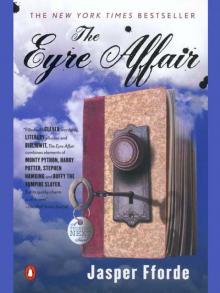 The Eyre Affair
The Eyre Affair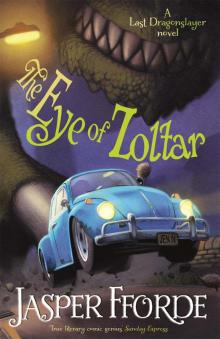 The Eye of Zoltar
The Eye of Zoltar The Woman Who Died a Lot
The Woman Who Died a Lot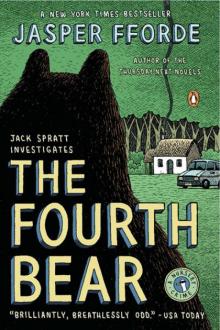 The Fourth Bear
The Fourth Bear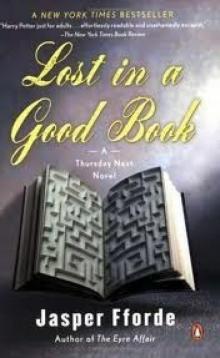 Lost in a Good Book
Lost in a Good Book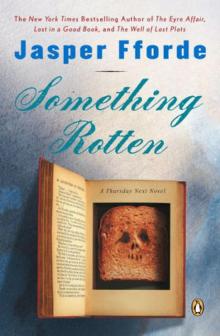 Something Rotten
Something Rotten The Well of Lost Plots
The Well of Lost Plots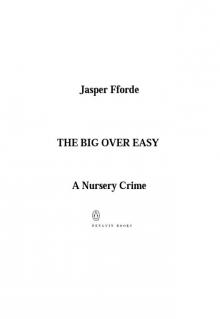 The Big Over Easy
The Big Over Easy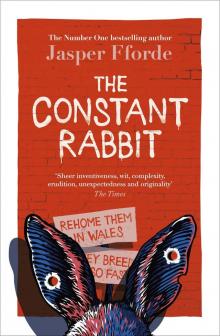 The Constant Rabbit
The Constant Rabbit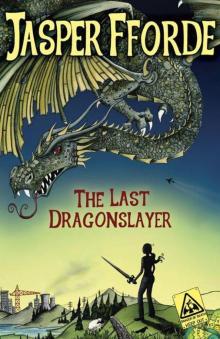 The Last Dragonslayer
The Last Dragonslayer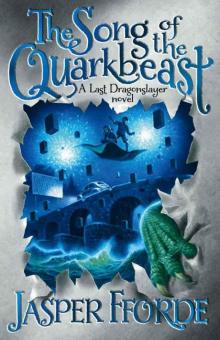 The Song of the Quarkbeast
The Song of the Quarkbeast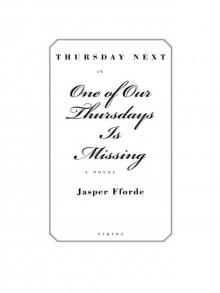 One of Our Thursdays Is Missing
One of Our Thursdays Is Missing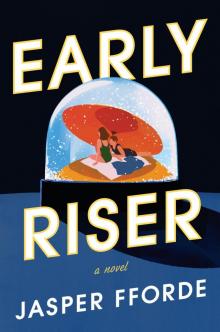 Early Riser
Early Riser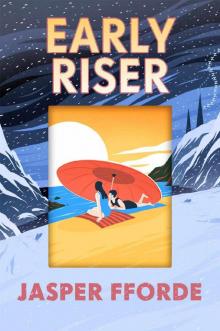 Early Riser_The new standalone novel from the Number One bestselling author
Early Riser_The new standalone novel from the Number One bestselling author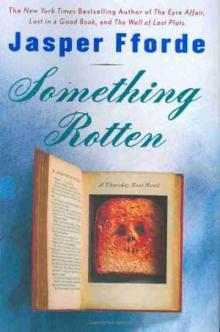 Something rotten n-4
Something rotten n-4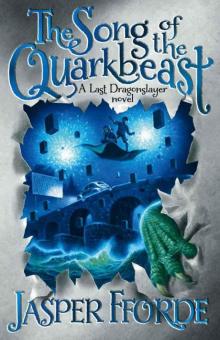 The Song of the Quarkbeast tld-2
The Song of the Quarkbeast tld-2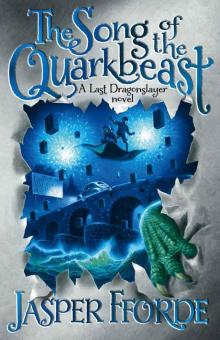 The Song of the Quarkbeast: Last Dragonslayer: Book Two
The Song of the Quarkbeast: Last Dragonslayer: Book Two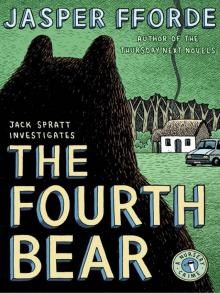 The Fourth Bear nc-2
The Fourth Bear nc-2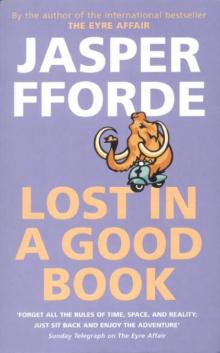 Lost in a Good Book tn-2
Lost in a Good Book tn-2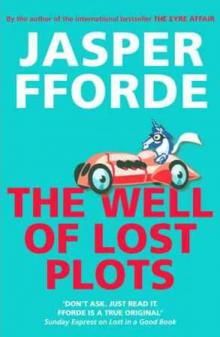 The Well of Lost Plots n-3
The Well of Lost Plots n-3 Thursday Next in First Among Sequels
Thursday Next in First Among Sequels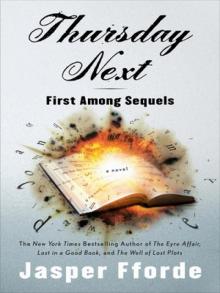 First Among Sequels tn-5
First Among Sequels tn-5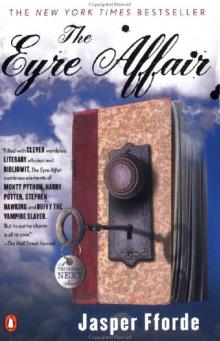 The Eyre Affair tn-1
The Eyre Affair tn-1